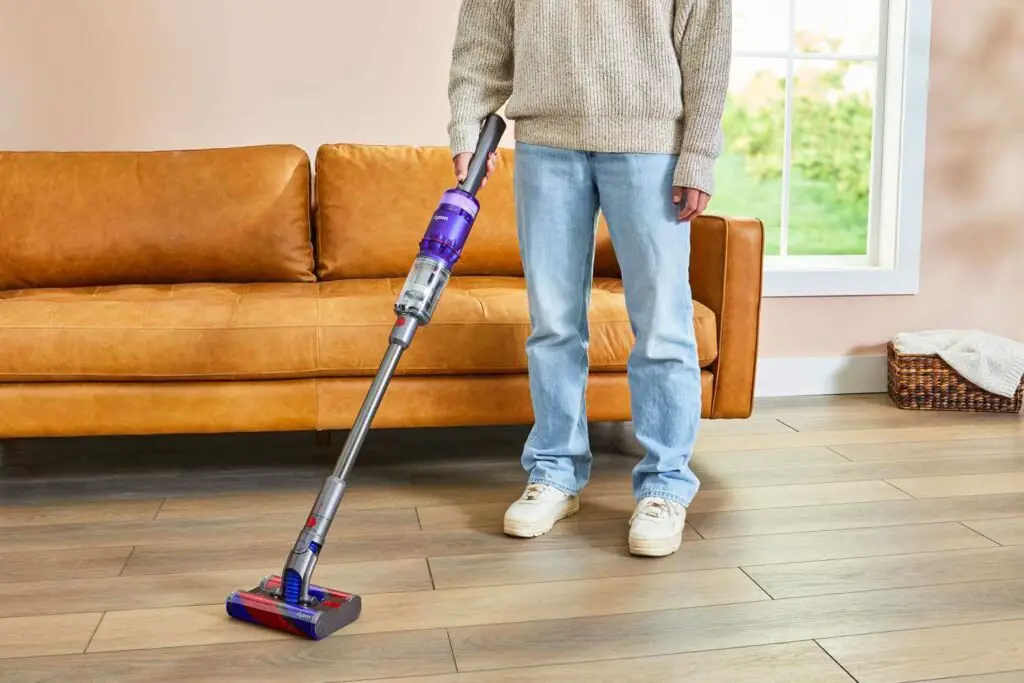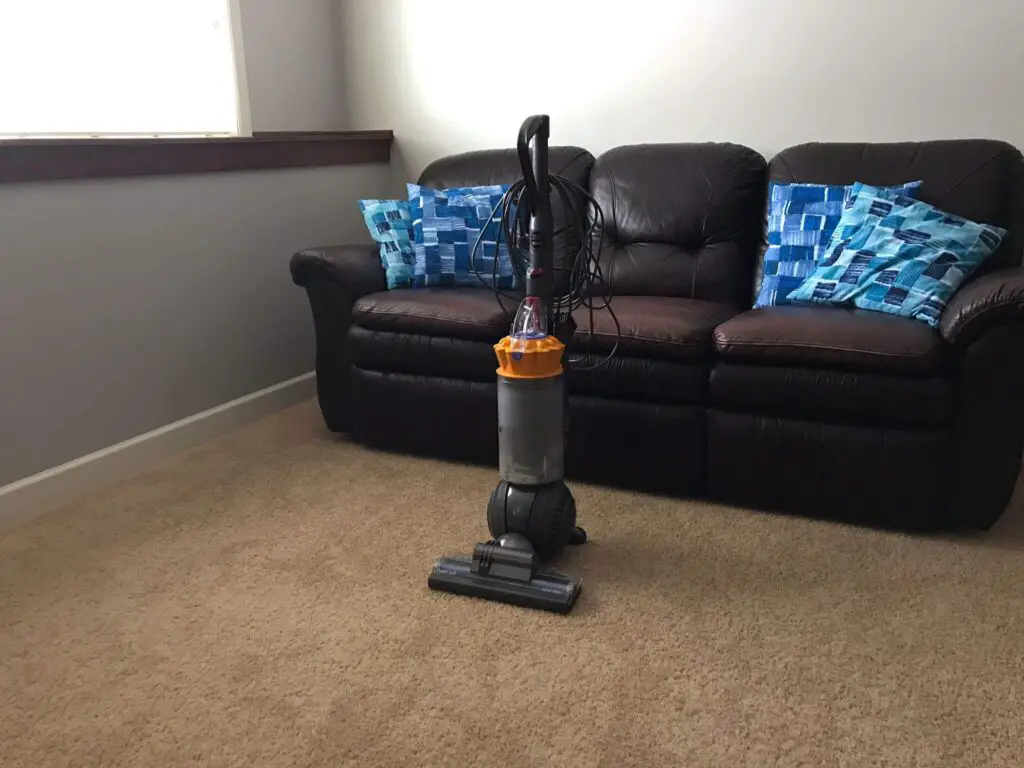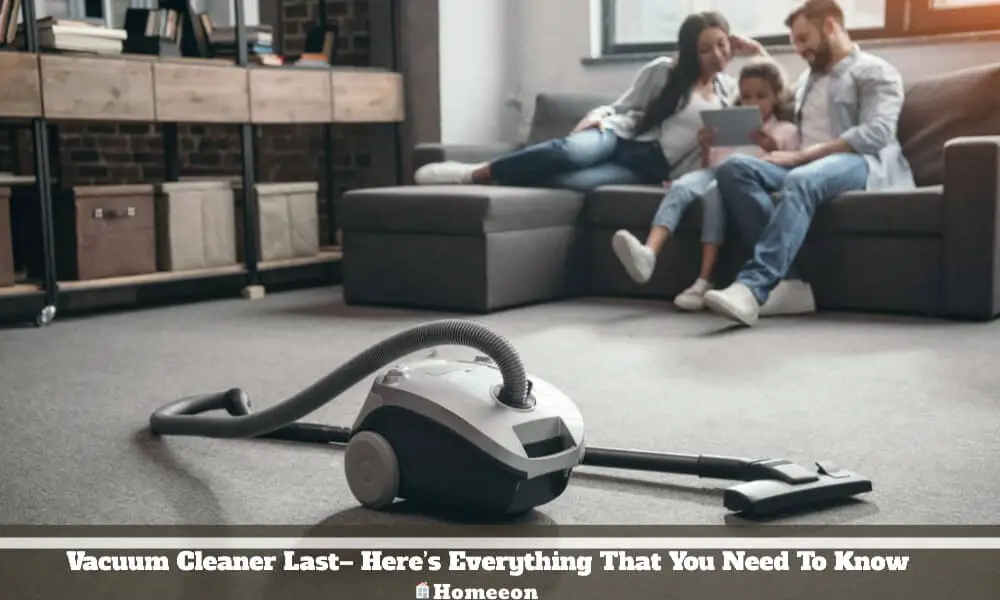Last Updated on August 1, 2023 By Emma W. Thomas
A vacuum cleaner’s lifespan typically ranges from 8 to 12 years, depending on the brand, quality, maintenance, and frequency of use. Regular cleaning and proper care can extend its longevity.
Types Of Vacuums And Their Lifespan
| Vacuum Type | Average Lifespan |
|---|---|
| Upright Vacuum Cleaner | 8-12 years |
| Canister Vacuum Cleaner | 8-10 years |
| Stick Vacuum Cleaner | 5-8 years |
| Handheld Vacuum Cleaner | 2-5 years |
| Robotic Vacuum Cleaner | 3-5 years |
Factors That Affect A Vacuum’s Lifespan

Your vacuum may last for a few days, months, or even several years depending on various factors that include;
The Make
Like with other items, the manufacturer plays a great role in determining the longevity of a vacuum cleaner. For example, big branded vacuums may last longer than the small unbranded tools from local stores, though this is not always the case.
While you may spend more money on bigger brands, their tools have better parts and higher standards. Most of these vacuums also come with warranties that are great for you, especially if they break down. The manufacturer may also indicate your tool’s expected lifespan, which acts as a guide when purchasing.
Proper Maintenance
Proper maintenance of your machine is also a crucial factor that impacts your tool’s longevity. If you clean your equipment at least once per month, it will prolong its usage for many years. Ensure that you get your vacuum repaired when you sense a problem such as loss of suction or strange noise. The following tips will help maintain your vacuum and prolong its lifespan;
Clean The Tool’s Filters
Vacuum filters pick up dust, pollen, smoke, and bacteria particles, making them dirty and clog up eventually. You need to clean these filters regularly for the machine to keep working well. Most vacuum cleaners have washable and reusable filters, and they need to be checked frequently. You can consider cleaning the filters under the faucet if they have debris and dust.
You can wash the filters using water only without any chemicals. You will then have to dry them thoroughly before putting them back into the tool to prevent the formation of mold and the release of spores into the air. Mold may negatively affect your health, such as eye irritation, skin rash, nasal congestion, and sore throat.
You will also have to replace the filters after every two or three years for better performance.
Regular Emptying Of The Dust Canister Or Bag
There are two types of vacuum cleaners, i.e., bagless or bagged. Regardless of the type that you are using, their bags need frequent emptying. Leaving the dust canister filled to the brim may clog your machine, making it less efficient. It may also affect the lifespan of the machine since it will strain to clean.
Untangling The Motorized Brush
A vacuum cleaner has a motorized brush at its base, capturing debris, carpet fibers, long hair, and dust. This brush is one of the essential parts of a vacuum, but it may stop spinning and cleaning properly if dirt wraps around it. Ensure that you remove any debris and hair from the motorized brush after every few weeks to keep it working. You can use a pair of scissors to cut the hair.
Usage
Your vacuum cleaner’s lifespan will also be affected by how you use it. Using the machine frequently exposes it to a lot of wear and tear, especially if the spaces are large. If your carpet and floors are heavily dirty and soiled, it will strain your tool more, which will overuse it.
Using the wrong height adjustment for a high pile on carpet or using the incorrect model will also shorten your vacuum’s life. You can avoid such models as handheld, stick, or robot vacuums when working on heavily soiled floors. Instead, it is advisable to use an upright vacuum.
The following practices while using your machine will shorten its life;
Cleaning Up Liquids
Some vacuums such as handheld models are designed for dry/wet vacuuming (cleaning up light spills of water). Ensure that you avoid models like stick vacuums, upright vacuums, and canister vacuums while cleaning liquid spills. Using these types may damage your machine and expose you to risks of electrocution.
You can use a paper towel or mop to wipe the liquid spills to ensure that your machine lasts longer.
Mishandling The Power Cord
Ensure that the power cord is held away from the vacuum cleaner while preventing it from getting frayed and cut by the motorized brush. If the cord gets cut, it will expose you to electric wires, making it unsafe for use. You also need to avoid pulling the vacuum by the cord, as this may also cut it.
Vacuuming Before Tidying Up
Make sure that you tidy up your floors and carpets before vacuuming to prevent damaging your machine. Removing tiny objects such as coins, toys, screws, and broken glass with your equipment may damage it. Such items may also spoil the bag.
Different Types Of Vacuum Cleaners And Their Estimated Lifespan
A vacuum cleaner can last for eight years, while others may last for fewer or more years, depending on the type. Different vacuums have varying lifespans for example;
Upright Vacuum Cleaners
Upright vacuums are regarded as the original vacuum designs, and they are the largest and bulkiest cleaning machines that you can get. While these tools may not be versatile to carry around or easy to store, they are long-lasting and have more suction and stronger construction.
This kind of vacuum can last for up to eight years and beyond, and they are usually corded, and you need not worry about batteries.
Stick Vacuums
This type of vacuum is versatile for cleaning since they are lightweight. These machines are designed to use on heavily soiled floors and are also easy to use around your home. The vacuums are not suitable for cleaning heavily soiled floors and are not durable.
This type of vacuum lasts between five to eight years
Canister
Like upright vacuums, canister vacuums provide great power and suction. They are also corded and can last for up to eight years. Since these vacuums are more portable, they may not last for long due to misuse.
Handheld Vacuums
This type of vacuum is designed to be easy to use and lightweight. You can easily use it in the car or around your home. Its motor is not very powerful, but you can run it on batteries. This vacuum lasts between two and three years when taken good care of.
Robot Vacuums
Robot vacuums are among the newest models which operate on their own. These vacuums are ideal for vacuuming if you are busy with other things or when you want to chill out. One disadvantage of these machines is that they are not as robust as upright vacuums, and they may also get damaged since you are not operating them directly.
Robot vacuums function by using a built-in battery that cannot be replaced. Your machine will, therefore, last as long as the battery is working. Their lifespan can go up to around three to five years.
Is It Worth Repairing A Vacuum Cleaner?

From the Consumer Report surveys, it is not worth repairing an upright vacuum cleaner after five years. It is also not advisable to fix canister vacuums that are beyond seven years old. However, some repairs will make sense even if the device is old, as long as the cost of repair does not exceed half the cost of buying a new one.
The following repairs could be worth it:
- If your machine becomes difficult pushing it across the carpet: you can raise the height using a manual carpet-height adjustment to solve this problem. But, do not raise it too high as this will affect your carpet cleaning.
- Brush roll fails to turn: if the brush roll barely turns when it should, check it for fabric, hair, and debris. If it does not have all these, you can replace it at the cost of between $3 and $40.
- Weak suction and the hose is not clogged: if your vacuum cleaner is bagless, you can try to clean or replace the filters that may trap dirt and protect the motor. You can replace this part with a bagged device at the cost of $10 to $70.
- If the items such as paper clips and pieces of other objects get stuck in the hose: you can use a broomstick to unclog it.
- When the vacuum stops while working: most vacuum models have an overload switch that disconnects power when the motor gets hot. Allow the motor to cool for a short while, then restart the machine. Try also to check for clogs or if the bag is full as these are the major causes of overheating.
Conclusion
Vacuum cleaners may last up to eight years or more, depending on the brand, usage, and maintenance. You need to ensure safe practice when using this tool to prolong its life and efficiency. It is advisable to clean or replace the filters regularly and handle the cord carefully to avoid damaging your vacuum.
References:
https://www.getonedesk.com/blog/how-long-do-vacuums-last
https://thehardwarehub.co.uk/how-long-does-a-vacuum-cleaner-last/
Emma is a graduate of Domestic Science or Family and Consumer Sciences (Home Economics) from the University of Wisconsin. She has 7 years of experience Working with the strategic section of BestBuy and now writing full-time for Homeeon.
From Managing the Home, Interiors, Cleaning, and Exteriors to Gardening and everything about Making A Home Liveable – is her passion and this Homeeon is the result of this.
Emma loves decorating her home with the best stuff found online. She cares about quality over anything and writes reviews about them here in Homeeon. Get in touch with her over Pinterest.
Keep reading her blogs.
